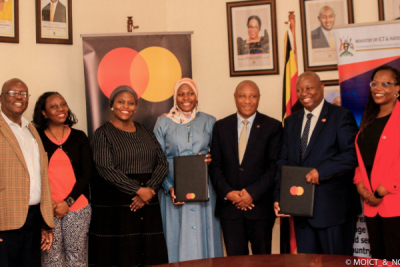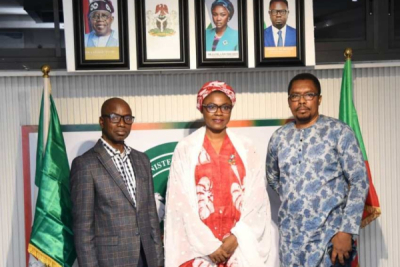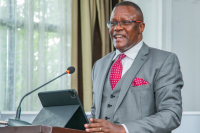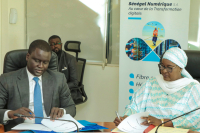
Public Management (603)
Artificial intelligence is now seen as an essential tool to effectively advance strategic sectors in Africa. Governments are therefore looking for partners capable of assisting them in harnessing this powerful tool.
Benin and Canada recently discussed cooperation in the field of artificial intelligence, the Beninese Ministry of Digital Technology announced in a press release issued Tuesday. According to the release, the discussions were held during a round table on the sidelines of the visit, to Benin, by Raymonde Gagné (photo, left), President of the Canadian Senate.
"Benin's adoption of a National Strategy for Artificial Intelligence and Big Data (SNIAM) in January 2023 positions the country to seize current and future opportunities in AI and big data processing. This makes it even more attractive for all types of investments, particularly from the private sector and development partners," the release states.
Benin recently launched the implementation of its National Artificial Intelligence and Megadata Strategy. The aim is to capitalize on current and future opportunities offered by AI to develop the digital economy and exploit technological solutions tailored to the country's needs, particularly in the fields of education, health, agriculture, the living environment, and tourism.
In considering collaboration with Canada, Benin hopes to benefit from the expertise of this country, which has strengthened its leadership in AI research and commercialization. According to the report "Impact and Opportunity: Canada's AI Ecosystem in 2023" published by British multinational firm Deloitte, Canada is home to around 670 AI startups. It also ranks third among G7 countries in terms of total funding per capita for generative AI companies.
A partnership between the two countries should also enable the exchange of knowledge and best practices in artificial intelligence. For Benin, this collaboration would be crucial to support the implementation of its strategy, which requires an estimated $7.8 million investment over five years.
Samira Njoya
Burkina Faso has been working to digitize its land sector for several years. The government has launched multiple initiatives to streamline the process as part of these reforms.
Burkina Faso launched a digital platform on Tuesday to collect data on plots of land and housing from private property developers and housing cooperatives, dating back to 2008. The aim is to ensure the accuracy of information and increase transparency in assessing real estate liabilities in private property development.
According to Maxime Tiendrébéogo, Secretary General of the Ministry in charge of Urban Planning and Land Affairs, to collect data for the platform, a commission was set up to collect administrative data from various institutions, including the ministries of Territorial Administration, Economy, and Urban Planning. “At the same time, information was requested from previously approved real estate developers and housing cooperatives, following a certain number of templates.”
The platform will require buyers to provide information on the plot or dwelling, including surface area, cost, the name of the property development company or housing cooperative, and the state of site servicing, such as the opening and resurfacing of access roads, drinking water supply, electricity, and street lighting. All these data are due by March 22.
It is part of the "Fiscal Cadastre" project, which was validated in 2018 by the Burkinabe authorities to digitize the land domain and gain access to important data.
In December 2021, the government introduced an integrated cadastre and domain management system (SYC@D) to better manage the cadastral sections of communes and arrondissements. The system is part of the "Fiscal Cadastre" project, which aims to improve the management of land and real estate in Burkina Faso.
Adoni Conrad Quenum
The Ugandan government is committed to accelerating digital transformation and supporting all sectors of the economy. To this end, it is multiplying partnerships likely to help achieve this objective.
Mastercard announced on Tuesday, February 27, a memorandum of understanding with Uganda’s Ministry of ICT and National Directions. The agreement aims to stimulate socio-economic development, enhance services, and foster financial inclusion in Uganda.
The partnership includes Mastercard’s technical assistance to bolster the Ugandan government’s efforts toward digitization and financial inclusion. This encompasses the digitization of traditional services like Posta Uganda and the national postal service, to generate new revenue streams and provide integrated, user-friendly experiences.
The collaboration also aims to enhance the capabilities of Ugandan startups, enabling them to thrive in the digital era. Specifically, micro and small merchants will be equipped with the necessary tools to connect to the global digital economy and accept electronic payments, thereby broadening their market reach and reinforcing their contribution to Uganda’s economic growth.
This initiative aligns with Uganda’s digital transformation goals outlined in the “Vision 2040” digital strategy. It seeks to empower citizens by aiming for universal inclusion, sustainable development, economic advancement, and poverty eradication through digital innovation across various sectors.
The partnership aligns with Mastercard’s goal of enhancing financial inclusion by integrating one billion unbanked and underserved individuals into the digital economy by 2025. This includes empowering 50 million micro and small traders and supporting 25 million businesses owned or led by women.
Samira Njoya
Nigeria's government is pursuing a strategic partnership focused on digital transformation and job creation through technology skills development.
The Nigerian Ministry of Youth Development has announced plans to partner with American Tower Corporation (ATC) Nigeria, a leading provider of telecommunications and technology infrastructure, to offer free Information and Communication Technology (ICT) training to young people in the country.
The announcement was made on Friday, February 23, in Abuja by the Minister of Youth Development, Ms. Jamila Bio Ibrahim (pictured center), during a visit by a delegation from ATC led by Mr. Ehize Ilozavbie (pictured right), Head of Public Affairs for Africa at ATC.
"The ministry’s major mandate is to create an enabling environment for the youth to thrive and to prepare them for the 21st century economy just as President Bola Tinubu has emphasised severally in most of his engagements. We are ready to partner with you in the area of information communication technology, which is the main area of partnership with your corporation that our youths can benefit from," the Minister said.
In the wake of the technological revolution, digital skills have become a necessity rather than an option. The Nigerian government, through the Ministry of Communications and Digital Economy, has implemented several ICT training programs to enable the local population to acquire these essential skills. These initiatives allow Nigeria, one of the most mature technology ecosystems on the continent, to support its digital transformation and foster creativity among the country's youth.
ATC operates in 33 states across Nigeria and, according to Mr. Ilozavbie, it has already trained over 50,000 Nigerians.
Adoni Conrad Quenum
South Africa is looking to capitalize on the growing trend of remote work by attracting "digital nomads" to its shores, hoping to boost tourism and inject dynamism into the local economy.
The South African Department of Home Affairs has released draft amendments to current immigration regulations, which include two new visa categories: a visa for remote work and a visa for essential skills. South African President Cyril Ramaphosa announced the news in his newsletter last week.
"A remote worker who wants to work in South Africa while being employed by a foreign company will be able to receive such a visa. [...] International experience shows that employees with critical skills contribute to improved productivity, enhanced innovation, and improving the competitiveness of the firms they work for," he wrote.
To be eligible for the remote work visa, digital nomads must meet several criteria, including qualifications, language skills, professional experience, and a job offer. They must also have a minimum annual income of at least 1 million rand (around $53,088) to live adequately in the country.
Countries such as Cape Verde, Mauritius, and the Seychelles are already offering this type of visa to tap into the rich market of 35 million digital nomads worldwide. The Western Cape Government has invited public comment on the proposed amendments
Adoni Conrad Quenum
African countries are accelerating their digital transformation efforts, improving services, and adopting new technologies to drive efficiency across various sectors. Governments are modernizing infrastructure, rolling out broadband internet, and investing in innovative solutions to address challenges in healthcare, education, agriculture, and finance.
Tanzania is exploring the use of artificial intelligence (AI) to streamline public service delivery and combat inefficiency, officials announced at the annual e-government meeting (Arusha, February 6-8).
"Physical delivery of services in public institutions and government agencies continues to be a challenge due to the prevalent lackadaisical attitude among many workers. This often results in delays and substandard executions of tasks.[...] We also want to totally eradicate queues and delays as people scramble to be served at public institutions and organizations, something that has been raising many complaints from people across the country," said George Simbachawene, Minister of State for Public Service Management and Good Governance, citing prevalent disinterest among some public servants as a key challenge.
AI adoption in Africa is gaining momentum, driven by its potential to improve online services across various sectors. Several countries are actively pursuing this technology, backed by international support.
Last November, the UK and partners pledged £80 million to boost AI development in Africa, while UNESCO earlier supported Morocco's digital transformation efforts including AI.
However, concerns exist about Africa becoming a testing ground for unproven AI solutions. Seydina Moussa Ndiaye, a UN AI advisor, urges African countries to implement "real control" over the technology to avoid exploitation.
Adoni Conrad Quenum
Mobile phones are the primary conduit for internet access in Africa, according to the International Telecommunication Union (ITU). This realization prompts several countries to implement strategies for promoting affordable, high-quality handsets.
The East Africa Device Assembly Kenya (EADAK) manufactured 194,000 smartphones in its initial quarter of operation, from October to December 2023, according to an announcement by Kenya’s Minister of Information and Communication Technology, Eliud Owalo (photo).
The local assembly plant, located in Athi River, Machakos County, is part of the government’s initiative to offer high-quality devices at affordable prices. Owalo announced during the 2nd African preparatory meeting for the World Telecommunication Standardization Assembly (WTSA) 2024 in Nairobi on February 5.
He stressed that the domestically assembled phones would bolster the country’s digital inclusion efforts, with the government aiming to produce 3 million smartphones annually. The EADAK factory, a collaboration between the state and several private firms, including Chinese company Shenzhen TeleOne Technology, Safaricom, and Jamii, has created 310 direct jobs for Kenyans.
As of September 2023, 32.63 million of the 64.67 million mobile phones connected to the national telecoms network were smartphones – a penetration rate of 50.5%, according to the latest data from the Kenya Communications Authority. Digital technology is a key component of Kenya’s Vision 2030 economic and social development program.
For the past decade, national authorities have been striving towards this goal through the digitization of public services, the transition to digital payment methods, and the promotion of fintech solutions. The government views increasing access to smartphones as a means to ensure citizens’ access to these digital services and their participation in the 4.0 economy.
The EADAK factory primarily produces smartphones compatible with fourth-generation technology. Owalo disclosed that designs for fifth-generation smartphones are currently underway. Kenya has had an active 5G mobile network since the end of 2022.
Senegalese authorities have restricted mobile internet access, echoing a move made in 2023 during demonstrations in support of opposition leader Ousmane Sonko.
Senegalese authorities suspended mobile internet access nationwide from Sunday evening, citing concerns about "hateful and subversive messages" circulating online ahead of planned protests against the postponement of the presidential election.
The Ministry of Communication, Telecommunications and Digital Economy announced the temporary suspension in a statement late Sunday, saying it aimed to "prevent public order disturbances." The move follows Saturday's announcement by the outgoing president of a delay in the election, sparking calls for demonstrations.
This is not the first time internet access has been restricted in Senegal during politically sensitive periods. In 2023, mobile data was cut for nearly five days following the arrest of opposition leader Ousmane Sonko. Critics have condemned both instances as violations of freedom of expression. The suspension has resulted in a significant financial loss for the Senegalese economy, according to the specialist British platform Top10VPN which put the loss at XOF34.9 billion (nearly $58 million).
The restriction has also impacted various players in the informal sector, including VTC drivers, online vendors, and delivery drivers, for whom mobile Internet is integral to their activities. As of September 2023, the country had 18,595,000 mobile Internet subscribers, per data from telecom regulator ARTP.
Adoni Conrad Quenum
Senegal is fully committed to digitizing its entire healthcare system. In a bid to achieve its goals, the government is multiplying its initiatives in collaboration with all the stakeholders in the sector.
Senegal's state-owned digital infrastructure company, Sénégal Numérique SA (Senum SA), and the Ministry of Health and Social Action signed an agreement on Tuesday to speed up the digitization of the country's healthcare system.
According to Cheikh Bakhoum (photo, left), CEO of Senum SA, the agreement encompasses various activities, including the domestic hosting of health data, which was previously stored abroad. The data will now be housed within Senegal, specifically in national resource centers.
Under this three-year collaboration, Senum SA will aid in the execution of all digital projects within the sector, host data in the national data center, and enhance connectivity for healthcare facilities, among other tasks. The company will also augment the hosting capacity and bandwidth for digital health records, including the shared patient file (Dpp), telemedicine, the hospital information system, the geographic health system, the digitization of medicines, community health processes, and electronic health governance.
The partnership aligns with the 2023-2027 healthcare system digitization program (PDSS), a government-led initiative. The program, which has received significant financial backing from the World Bank to the tune of $50 million, coincides with the country’s efforts to construct data centers dedicated to storing and hosting national data. The most recent addition to this infrastructure is a Tier 3 data center, established in Diamniadio.
Samira Njoya
Senegal's ongoing drive to digitize administrative services marks a significant milestone as GUDE embarks on its digital transformation journey. This crucial segment of the Senegalese economy, previously undergoing initial digitization efforts, has now entered a key phase that promises to streamline procedures and enhance efficiency.
Starting February 1, Senegal's authorities will expand the Single Dematerialized Collection Desk (GUDE) to all participants in the port sector. The move aims to enhance the Port of Dakar (PAD)'s efficiency, increase the port platform's revenue, and simplify procedures for economic operators.
Makhtar Lakh, Secretary General of the Ministry of Commerce, Consumer Affairs, and Small and Medium-sized Enterprises, stated that the new system for dematerializing collection procedures would save operators time and resources, reduce state and consumer costs, and improve operation predictability.
The GUDE, a collaboration between the PAD, the General Directorate of Customs, and the Community of Port Actors, will extend to other services such as transit, export, and transfers to customs clearance areas outside the PAD over the next three months.
The GUDE's launch is part of Senegal's public sector's ongoing digital transformation. Despite the digital transition's progress, many services are still catching up with the country's public administrations' technological revolution.
Earlier this month, the General Directorate of Public Accounting and the Treasury (DGCPT) introduced an online payment service for road fines. Last November, Senegal Numérique, the national company responsible for managing the State's digital infrastructures, partnered with Blaise Diagne International Airport to digitize all airports in the country.
Adoni Conrad Quenum
More...
Kenya is aiming to become a leading technology hub in Africa, ramping up investment in the sector and forging strategic partnerships to fast-track its ambitions.
Kenyan President William Ruto (photo, right) announced on Saturday, January 27, during the inauguration of the Mukiria Technical Training Institute’s teaching block and engineering workshop in Central Imenti, that China has been chosen to equip the country’s digital hubs. The initiative aims to provide Kenyan youth with digital skills.
Ruto emphasized the importance of investing in technical colleges and ICT hubs to ensure that the youth acquire the necessary competencies to monetize their knowledge and skills, thereby contributing to the country’s economic development.
"Our investment in technical colleges and ICT hubs guarantees our youth the acquisition of competencies to help them monetize their knowledge and skills so that they can contribute meaningfully to our economic development," he said.
The Kenyan government has prioritized digital technology in its development policy, taking steps to enable its population, particularly the youth, to keep up with the global technological revolution. The establishment of various digital hubs is a part of this initiative, and the government has increased the education budget to support this project.
“Technical training is a crucial element of the Kenyan government’s strategy to equip our human capital, especially the youth, with skills that can significantly contribute to the country’s development,” Ruto explained.
Kenya, along with Nigeria, Egypt, and South Africa, boasts one of the most advanced technological ecosystems in Africa. As of early 2023, Kenya had 17.86 million Internet users, representing an Internet penetration rate of 32.7%, according to DataReportal.
Adoni Conrad Quenum
Across Africa, a rapid digital transformation is fueling the continent's economic emergence. Massive investments in technological infrastructure are laying the groundwork for innovation, job creation, and enhanced connectivity, offering a powerful catalyst for growth.
Swedish telecoms giant Ericsson is teaming up with the Malagasy government to accelerate the country's digital transformation, following a recent working visit by its regional leadership.
Strategic meetings with key partners, customers, and industry leaders explored leveraging Ericsson's technologies to expand mobile broadband, bridge the digital divide, and empower individuals, businesses, and communities.
"The engagements focused on Madagascar’s Information and Communications Technology (ICT) landscape and delved into areas of collaboration to leverage Ericsson’s innovation to expand mobile broadband access, drive digital inclusion, and create unlimited opportunities for individuals, empower businesses, and transform communities," an Ericsson release points out.
This initiative is part of Ericsson's #AfricaInMotion vision, aiming to contribute to sustainable development and digitization across the African continent. Ericsson's commitment to Madagascar includes recent collaborations like the 2Africa submarine cable project alongside Vodafone. The company is also intensifying investments in telecom infrastructure across its African markets.
The recent working visit thus reaffirms Ericsson's commitment to supporting Madagascar's digital transformation ambitions, contributing to a more connected and prosperous future for the island nation. According to the company's Mobility Report published in November 2023, mobile subscriptions in sub-Saharan Africa are forecast to grow by 3% annually. The number of subscriptions is expected to rise from 940 million in 2023 to 1.1 billion in 2029, with 5G leading this rapid expansion.
Samira Njoya
Ghana's public utilities are joining a wave of digital transformation sweeping across Africa, aiming to improve efficiency, transparency, and service delivery in vital sectors like water, electricity, and sanitation. The move reflects a broader trend across the continent, where countries are increasingly leveraging technology to modernize infrastructure, boost economic growth, and improve citizens' lives.
Ghana’s state-owned Electricity Company (ECG) announced on Saturday, January 27, the digitization of several of its services. Customers will need to use the company’s mobile app to access services such as requesting a new contract, a sub-meter, or an additional load, to enhance service quality.
The company issued a press release stating, “This paperless system will require prospective customers applying for service to use the ECG Mobile App and follow the prompts therein, including uploading all required documents for the processing of service requests.” It further advised customers to provide accurate information when applying for the service, noting that all responses regarding their applications would be communicated via the contact telephone numbers provided.
Digital transformation is accelerating in Ghana, as in many other African countries, with an increasing number of public bodies digitizing their services to simplify daily life for citizens. According to the “E-Government Survey 2022 The Future of Digital Government” report by the United Nations Department of Economic and Social Affairs (UN DESA), Ghana, under the leadership of Nana Akufo-Addo, is one of sixteen African champions in e-government, outperforming other West African countries like Cape Verde and Côte d’Ivoire.
DataReportal data indicates that Ghana had 23.05 million internet users at the start of 2023, representing an internet penetration rate of 68.2%.
Adoni Conrad Quenum
In a bid to bolster the nation's digital economy, Tanzanian officials have opted to forge strategic alliances.
Minister of Information and Communication Technologies Nape Nnauye (pictured center) signed a memorandum of understanding (MoU) with NMB Bank executives this weekend in Dar es Salaam. "This agreement aligns with our Ten-Year Digital Economy Strategy (2024-2034)," Nnauye emphasized, highlighting the government's commitment to fostering local tech advancement.
The partnership positions NMB Bank as a key player in Tanzania's digital drive. The collaboration will see the bank co-design crucial digital systems alongside public authorities. Examples include the "Jamii Namba" citizen identification platform and the electronic "Know Your Customer" (eKYC) protocol for streamlined online service delivery.
NMB Bank CEO Ruth Zaipuna (pictured left) welcomed the partnership, stating, "Strengthening the digital economy benefits both NMB Bank and the broader financial sector by enabling improved delivery of financial services across the country."
This move aligns with President Samia Suluhu's vision of a thriving digital economy as a vital engine for Tanzania's development. The country's growing online presence is undeniable, with DataReportal data citing 21 million internet users and 4.90 million social media users as of 2023, translating to a 31.6% internet penetration rate.
Adoni Conrad Quenum















